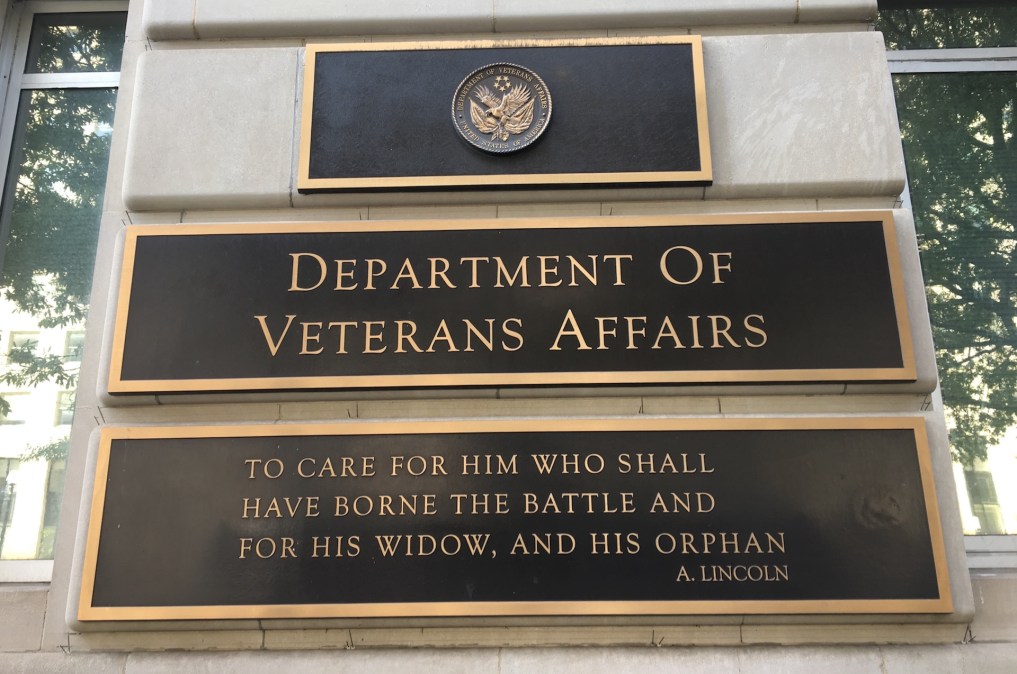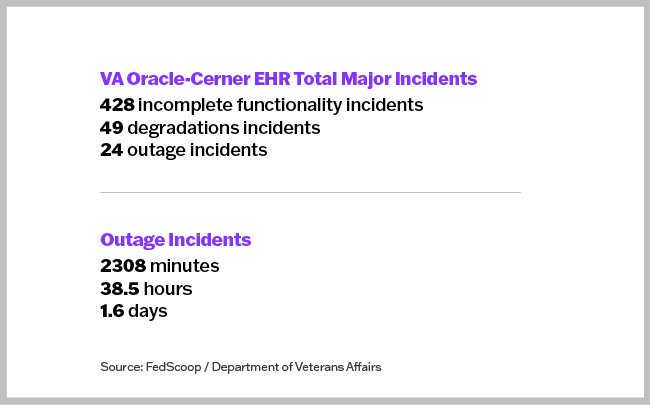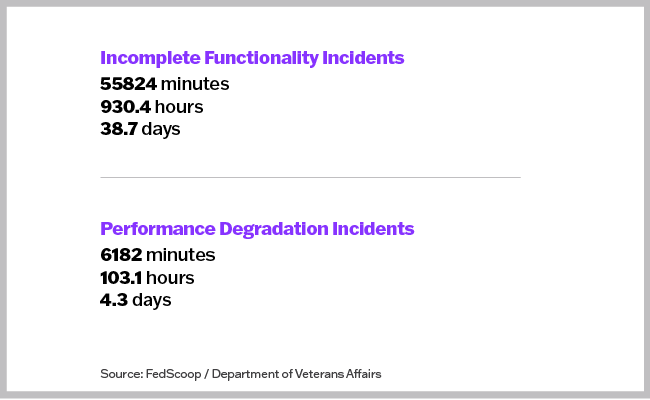VA data shows Oracle Cerner electronic health record system hit with nearly 500 major incidents

The Department of Veteran Affairs has recorded almost 500 major incidents with its new Oracle Cerner electronic health records system and at least 45 days of downtime within the system since it was rolled out in the fall of 2020, according to internal VA data.
A dataset obtained by FedScoop through a Freedom of Information Act request shows that the Oracle Cerner EHR system had a total of 498 major incidents between Sept. 8, 2020 and June 10, 2022.
The data includes 930 hours of “incomplete functionality” where the system was partially not working, over 103 hours of degraded performance and almost 40 hours of “outage,” which means that the system was completely down.

The dataset provides the most complete picture of system outages available to the public so far, however, separate internal agency communications also obtained by this publication point to a lack of clarity over how the VA discloses multi-day outages.
In at least one instance, descriptions of multi-day outages between VA officials in internal agency emails seen by FedScoop did not match up with the disclosed data. Multi-day outages are significant because it takes the VA longer to analyze and respond to the root causes of prolonged down time.
The latest dataset obtained by FedScoop also identifies the VA as the responsible party in approximately one-third of the incidents that have occurred in the past two years, while Oracle-Cerner is responsible in about two-thirds of the incidents. In almost half of the incidents the root cause is not clear to the VA, according to the reported data.
In a statement provided to this publication, Secretary of Veterans Affairs Denis McDonough, said: “The bottom line is that my confidence in the EHR is badly shaken. Regardless of whether an outage in the system lasts for one minute or one hour or one day, any outage or delay is unacceptable for the Veterans we serve and our VA health care providers who serve them.
He added: “The goal of the new system is, and always has been, to provide better health outcomes for Veterans and a better experience for providers. Right now, the system is not meeting those goals and needs major improvement. we at VA could not be more frustrated on behalf of Veterans and providers, and we’re holding Cerner, Oracle, and ourselves accountable to get this right.”
McDonough in the statement reiterated that the department has paused all future deployments of the system until 2023.
Commenting on the dataset, House Veterans Affairs Subcommittee on Technology Modernizing Ranking Member Mike Bost, R-Ill., said: “The number of incidents listed in this disclosure is alarming. Some part of the Cerner system has been down more often than not for nearly two years.”
He added: “These problems have persisted since the very beginning of the rollout in 2020, and they put veterans at risk and make employees’ jobs impossible. If the Cerner electronic health record is not capable of delivering for veterans, it should not be used in any VA facility. Veterans, dedicated VA health professionals, and taxpayers deserve answers immediately.”
Another top member of the subcommittee, Rep. Matt Rosendale, R-Mont., told FedScoop that the VA was playing “word games” in its attempt to downplay harm, after reviewing the data.
Speaking with this publication, Rosendale referred to prior reporting by The Spokesman-Review which obtained a report that described 180 VA EHR incidents since Sept. 2021 that were classified as degradations, “downtime” and full or partial outages.

In a statement to FedScoop, VA Assistant Secretary for Information and Technology and Chief Information Officer Kurt Delbene said: “We at VA have been — and will continue to be — fully transparent about outages, degradations, and incidents that have caused unacceptable problems for our Veterans and our providers.”
He added: “The most urgent focus is on outages, as they have the broader, system-wide impacts, but we track, report, and are pushing Oracle Cerner to improve all three classes of issues.”
Lawmakers from both parties in recent weeks have aggressively called out rampant issues with the cost, transparency and reliability of the VA’s electronic health record (EHR) system rollout that have seriously put veterans’ lives at risk.
The EHR system rollout issues have in some instances — including at the center in Spokane, Washington — caused major harm in which a veteran at risk for suicide did not receive treatment because records disappeared in the computer system. This system error occurred due to technical issues with what’s known as an “unknown queue,” that has caused nearly 150 instances of patient harm, according to the VA’s Office of Inspector General (OIG).
The “unknown queue” feature of the EHR system is of the most significant risks to patient safety because it has allowed medication and treatment requests to disappear into a digital black hole where the orders inputed into the system don’t get delivered to their intended location.
Members of Congress are putting pressure on the VA to punish those within the agency and within Oracle-Cerner for the major issues that have plagued the new EHR system since it was rolled out.
“Veterans and employees deserve better. I call on the VA leadership to get serious about accountability and impose penalties commensurate with the failures, not the slaps on the wrist we have seen so far,” Rep. Jim Banks, R-Ind., told FedScoop after reviewing the VA EHR incident report obtained via FOIA.
Oracle Cerner did not respond to a request for comment.



